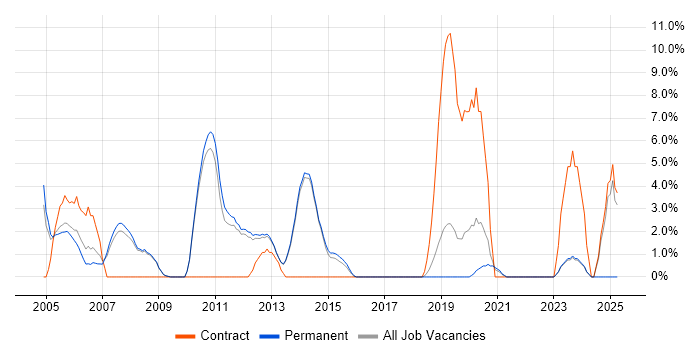Relational Database Management System (RDBMS)
Hampshire > Fleet
The table below provides summary statistics for contract job vacancies advertised in Fleet requiring RDBMS skills. It includes a benchmarking guide to the contractor rates offered in vacancies that cited RDBMS over the 6 months leading up to 1 May 2025, comparing them to the same period in the previous two years.
| 6 months to 1 May 2025 |
Same period 2024 | Same period 2023 | |
|---|---|---|---|
| Rank | 4 | - | - |
| Rank change year-on-year | - | - | - |
| Contract jobs citing RDBMS | 2 | 0 | 0 |
| As % of all contract jobs advertised in Fleet | 22.22% | - | - |
| As % of the Database & Business Intelligence category | 100.00% | - | - |
| Number of daily rates quoted | 2 | 0 | 0 |
| 10th Percentile | £416 | - | - |
| 25th Percentile | £436 | - | - |
| Median daily rate (50th Percentile) | £470 | - | - |
| 75th Percentile | £503 | - | - |
| 90th Percentile | £524 | - | - |
| Hampshire median daily rate | £470 | - | £550 |
| % change year-on-year | - | - | +22.22% |
All Database and Business Intelligence Skills
Fleet
RDBMS falls under the Databases and Business Intelligence category. For comparison with the information above, the following table provides summary statistics for all contract job vacancies requiring database or business intelligence skills in Fleet.
| Contract vacancies with a requirement for database or business intelligence skills | 2 | 1 | 0 |
| As % of all contract IT jobs advertised in Fleet | 22.22% | 11.11% | - |
| Number of daily rates quoted | 2 | 1 | 0 |
| 10th Percentile | £416 | - | - |
| 25th Percentile | £436 | £463 | - |
| Median daily rate (50th Percentile) | £470 | £475 | - |
| Median % change year-on-year | -1.16% | - | - |
| 75th Percentile | £503 | £488 | - |
| 90th Percentile | £524 | - | - |
| Hampshire median daily rate | £550 | £530 | £511 |
| % change year-on-year | +3.77% | +3.67% | +1.74% |
RDBMS
Job Vacancy Trend in Fleet
Job postings citing RDBMS as a proportion of all IT jobs advertised in Fleet.

RDBMS
Contractor Daily Rate Trend in Fleet
3-month moving average daily rate quoted in jobs citing RDBMS in Fleet.
RDBMS
Co-occurring Skills and Capabilities in Fleet by Category
The follow tables expand on the table above by listing co-occurrences grouped by category. The same employment type, locality and period is covered with up to 20 co-occurrences shown in each of the following categories:
